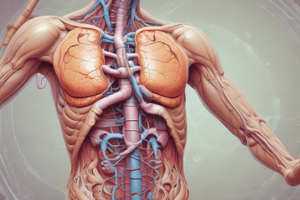Podcast
Questions and Answers
What is the primary function of the small intestine in relation to nutrient absorption?
What is the primary function of the small intestine in relation to nutrient absorption?
- Uptake of nutrients into the bloodstream through the walls (correct)
- Formation of feces through water absorption and electrolyte reabsorption
- Mechanical breakdown of food into smaller particles
- Release of gastric acid and pepsin into the lumen
What is the primary site of protein absorption in the gastrointestinal system?
What is the primary site of protein absorption in the gastrointestinal system?
- Small intestine (correct)
- Mouth
- Stomach
- Large intestine
Which hormone stimulates gastric acid secretion and gastric motility?
Which hormone stimulates gastric acid secretion and gastric motility?
- Gastrin (correct)
- Motilin
- Cholecystokinin (CCK)
- Secretin
What is the purpose of segmentation in the gastrointestinal system?
What is the purpose of segmentation in the gastrointestinal system?
What is the pH range of gastric acid secreted by parietal cells?
What is the pH range of gastric acid secreted by parietal cells?
Which of the following is NOT a function of the large intestine?
Which of the following is NOT a function of the large intestine?
Study Notes
Overview of Gastrointestinal Physiology
- The gastrointestinal (GI) system is responsible for the ingestion, digestion, and absorption of nutrients, as well as the elimination of waste products.
- The GI system consists of the mouth, esophagus, stomach, small intestine, and large intestine.
Motility and Movement
- Peristalsis: rhythmic, wave-like muscle contractions that propel food through the GI system
- Segmentation: localized, intermittent contractions that mix food with digestive enzymes
- Mass movement: strong, coordinated contractions that propel food through the large intestine
Digestion and Absorption
- Mechanical digestion: breakdown of food into smaller particles through chewing and grinding
- Chemical digestion: breakdown of nutrients into smaller molecules through enzymatic reactions
- Absorption: uptake of nutrients into the bloodstream through the walls of the small intestine
- Nutrient absorption sites:
- Carbohydrates: small intestine
- Proteins: small intestine
- Fats: small intestine and liver
Gastric Function
- Gastric acid: secreted by parietal cells, pH 1.5-2.5, denatures proteins and activates pepsin
- Pepsin: enzyme that breaks down proteins into smaller peptides
- Gastric mixing: contractions of the stomach mix food with gastric acid and pepsin
Small Intestine Function
- Brush border enzymes: enzymes embedded in the microvilli of enterocytes, break down carbohydrates and proteins
- Pancreatic juice: alkaline fluid containing digestive enzymes, secreted by the pancreas
- Bile: emulsifies fats, secreted by the liver and stored in the gallbladder
Large Intestine Function
- Water absorption: reabsorption of water and electrolytes from the colon
- Electrolyte absorption: reabsorption of sodium, potassium, and chloride from the colon
- Feces formation: remaining waste products are formed into feces
Hormonal Regulation
- Gastrin: stimulates gastric acid secretion and gastric motility
- Cholecystokinin (CCK): stimulates pancreatic juice secretion and gallbladder contraction
- Secretin: stimulates pancreatic juice secretion and bicarbonate production
- Motilin: stimulates gastric motility and hormone secretion
Studying That Suits You
Use AI to generate personalized quizzes and flashcards to suit your learning preferences.
Description
This quiz covers the functions and processes of the gastrointestinal system, including motility, digestion, absorption, and hormonal regulation. It explores the roles of different organs and enzymes in the breakdown and uptake of nutrients. Test your knowledge of the GI system!




